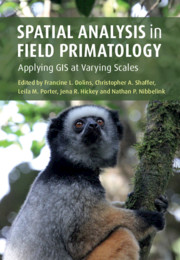Book contents
- Spatial Analysis in Field Primatology
- Spatial Analysis in Field Primatology
- Copyright page
- Dedication
- Contents
- Contributors
- Acknowledgments
- 1 Why Place Matters, and its Use in Primate Behavioral and Ecological Research
- Part I GPS for Primatologists
- Part II GIS Analysis in Fine-Scale Space
- Part III GIS Analysis in Broad-Scale Space
- Introduction
- 15 Modeling Niches and Mapping Distributions
- 16 Does Reduced Habitat Quality or Increased Hunter Access Explain Defaunation of Fragmented Forests?
- 17 Landscape Ecology of Deforestation Processes and Lemur Biogeography in Madagascar
- 18 Quantitative Methods for Primate Biogeography and Macroecology
- 19 GIS and GPS Techniques in an Ethnoprimatological Investigation of St Kitts Green Monkey (Chlorocebus sabaeus) Crop-Foraging Behavior
- 20 Conclusion
- Index
- Plate Section (PDF Only)
- References
19 - GIS and GPS Techniques in an Ethnoprimatological Investigation of St Kitts Green Monkey (Chlorocebus sabaeus) Crop-Foraging Behavior
from Part III - GIS Analysis in Broad-Scale Space
Published online by Cambridge University Press: 29 January 2021
- Spatial Analysis in Field Primatology
- Spatial Analysis in Field Primatology
- Copyright page
- Dedication
- Contents
- Contributors
- Acknowledgments
- 1 Why Place Matters, and its Use in Primate Behavioral and Ecological Research
- Part I GPS for Primatologists
- Part II GIS Analysis in Fine-Scale Space
- Part III GIS Analysis in Broad-Scale Space
- Introduction
- 15 Modeling Niches and Mapping Distributions
- 16 Does Reduced Habitat Quality or Increased Hunter Access Explain Defaunation of Fragmented Forests?
- 17 Landscape Ecology of Deforestation Processes and Lemur Biogeography in Madagascar
- 18 Quantitative Methods for Primate Biogeography and Macroecology
- 19 GIS and GPS Techniques in an Ethnoprimatological Investigation of St Kitts Green Monkey (Chlorocebus sabaeus) Crop-Foraging Behavior
- 20 Conclusion
- Index
- Plate Section (PDF Only)
- References
Summary
Over 350 years ago, the ecology of St Kitts, an island in the West Indies, was dramatically altered when Europeans arrived. The English and later French introduced sugar cane production, brought in a large African slave workforce, and (unintentionally) introduced a highly intelligent and adaptable invasive animal species, the green monkey (Chlorocebus sabaeus). Ever since green monkeys arrived in St Kitts, they have thrived on the island, in part by foraging on farmers’ crops. In this chapter, we utilize GIS and GPS techniques to generate a predictive model of this crop-foraging behavior. Additionally, we use ethnographic techniques to understand the nuanced ways in which historic land use changes in St Kitts have altered green monkey movements, and, in turn, Kittitians’ cultural conceptualization of monkeys. Our work shows the benefits of utilizing an ethnoprimatological framework and combining quantitative and qualitative data collection techniques in assessing human–nonhuman primate (NHP) conflict situations, which are inherently highly spatial in nature.
Information
- Type
- Chapter
- Information
- Spatial Analysis in Field PrimatologyApplying GIS at Varying Scales, pp. 403 - 427Publisher: Cambridge University PressPrint publication year: 2021
References
Accessibility standard: Unknown
Why this information is here
This section outlines the accessibility features of this content - including support for screen readers, full keyboard navigation and high-contrast display options. This may not be relevant for you.Accessibility Information
- 2
- Cited by
